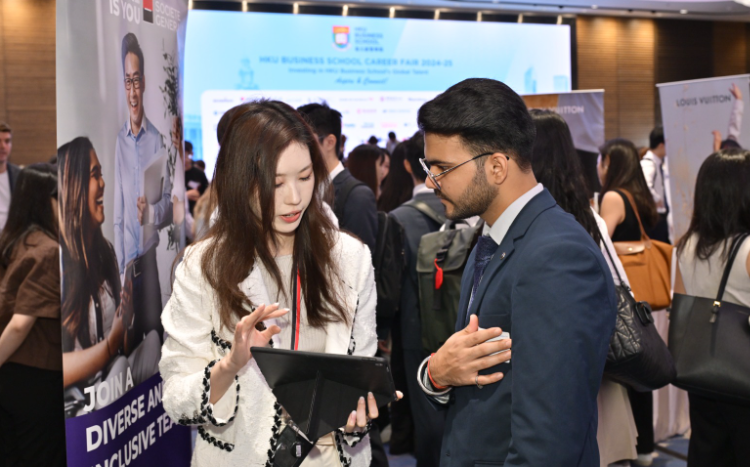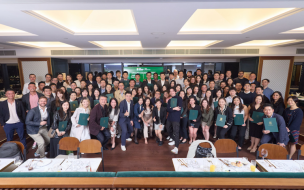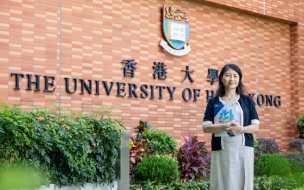That’s because Hong Kong University (HKU) Business School is a global leader when it comes to finance-focused master’s programs. HKU ranks 17 in QS World University Rankings 2025 and second in QS Asian University Rankings - Eastern Asia.
HKU’s three new master's degrees aim to meet growing global demand for accounting programs, address some major skills gaps and lead graduates into high-impact finance jobs within major organizations.
From wealth management to sustainable finance, here are the three new specialized master’s programs set to welcome students to HKU in September 2025.
3 New Specialized Master’s Programs To Consider In 2025
1. Master of Wealth Management
As one of the world’s major financial centers, Hong Kong needs professionals who can manage the growing amount of wealth in the region. But at the m
According to a survey by the Hong Kong Private Wealth Management Association (PWMA), 82% of member firms reported a talent gap for relationship managers, while 55% said they require more product specialists. To try and address that skills gap, HKU is launching its Master of Wealth Management.
Given that wealth management professionals tend to come from a range of different backgrounds, the requirements for the program reflect this. Students will need a bachelor’s degree (or equivalent) to be considered for the program, but it doesn’t have to be finance-related.
“We anticipate students coming from various undergraduate majors,” says Professor Yang Liu (pictured) who is the program director. “While we welcome students with conventional business backgrounds such as finance, economics, accounting, and marketing, we also embrace those from fields such as law, social sciences, media, and humanities.”
As for the program content, broadly speaking it is less technical and more comprehensive than a typical Master of Finance program. “These courses distinguish themselves from traditional finance courses by adopting a wealth manager's perspective, focusing on areas such as entrepreneurial finance and wealth management over economic cycles,” says Liu.
The core electives cover three main pillars: wealth management instruments, interpersonal skills, and law and compliance. Students will apply those theoretical skills when they create a comprehensive, tailored financial plan in the course project. The program sets students up for a career in wealth management, of course, but could also lead to roles in financial planning, asset management, consultancy or compliance. The areas that graduates end up in will be as diverse as the students themselves.
It's worth noting that the new master's is different from HKU's existing Master of Family Wealth Management program, which takes an interdisciplinary approach, focusing on family history and business, the history of wealth and financial markets, estate planning, and family office management.
2. Master of Sustainable Accounting & Finance
The 2016 Paris Agreement may have targeted a maximum 2 °C (3.6 °F) increase in global surface temperatures, but there’s seemingly no limit on the demand
“The demand for ESG talent has outgrown the supply in Hong Kong, China, and around the world,” explains Professor Dragon Yongjun Tang, program director of the new Master of Sustainable Accounting and Finance at HKU. “The graduates from our new program can help meet the market demand and fill the talent gap - not only for Hong Kong, but for China and other regions.”
This new master’s acts as a pathway towards a career in climate change, but from the financial side of things. Students will learn the skills necessary to help corporations, governments and other organizations achieve the United Nations’ Sustainable Development Goals and stay within the Paris Agreement limit. “Some graduates will become chief sustainability officers or other top executives of their organizations,” adds Tang (pictured).
Students aren’t necessarily expected to have prior experience in finance, with the program covering all of the core concepts related to sustainable finance such as climate economics, sustainable investment and ESG reporting.
Yet the master’s doesn’t just focus on ESG issues. Students can also take up to two electives from HKU’s other postgraduate courses. It means they will benefit from the experience and network of existing programs as well as the synergies with other finance master’s, according to Tang.
Ultimately, the aim is to produce graduates who are ready to make a green impact at the top level of major organizations.
3. Master of Accounting Analytics
In 2024, no business master’s saw a greater increase in demand than accounting. Almost three-quarters of business schools around the world reported a growth in applications, according to the Graduate Management Admission Council, suggesting there is plenty of student demand for more programs in this area.
That was part of the thinking behind the brand new Master of Accounting Analytics at HKU. It aims to help students master recent technological innovations in the industry, including areas related to AI and advanced data science.
“The primary focus of the program is to equip students with specialised tools used in the accounting industry to cope with the increasing market demand,” explains program director, Professor Kai Wai Hui (pictured).
Suitable for students with a strong background in accounting and/or technology, the program builds on HKU’s pre-existing Master of Accounting by adding technical expertise to traditional accounting concepts. “This is achieved through a focus on the utilisation of data, information technology, statistical analysis, quantitative methods, and mathematical models within the program,” says Hui.
Alongside the 21 courses within the program, Master of Accounting Analytics students can also take up to two electives from HKU’s other postgraduate programs. It allows students to build on their accounting expertise with specialist electives in areas of their choice.
One major benefit of this blend of tech and accounting skills is the diversity of fields it could lead into. Potential career paths include areas such as financial analysis, fraud detection, performance evaluation, compliance or risk management. Hui adds that graduates of the program will contribute to organisational growth, drive innovation, and navigate the complexities of an ever-evolving business landscape.
If you're still unsure about which program to choose, students can find out about the three new masters programmes by attending HKU Business School's online information sessions on 16 - 19 December.







